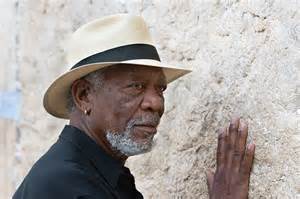Morgan Freeman got really sick at the age of 16, pneumonia, and an abscess developed on his lung that burst, and he almost died, and he states that some would say that God saved him. "Believers think God communicates to us through miracles, that miracles are proof of the divine." In this final episode of National Geographic Channel's The Story of God, we'll learn about what different religions and cultures believe in the power of miracles.
Freeman visits with Alcides Moreno, who lived after falling 500 feet from a Manhattan building where he and his brother were washing windows in 2008. The platform they were on broke, and they fell 47 stories. Moreno survived after breaking 10 bones, a punctured lung, needing 43 pints of blood and plasma, and three weeks in a coma, but his brother died.
People tell him that he is a miracle, including the doctors. He has a hard time with that line of thinking because his brother, Edgar, died. He does believe that God saved him, but he struggles with why him and not his brother, and,"looks forward to finding out exactly what to do." He wonders what God's plan is for him.
He goes to Jerusalem and celebrates Passover with a Jewish family, including the first Israeli female Rabbi, to learn about the miracles that happened to lead the Jewish people out of Egypt.
A trip to Rome lends to discussion with Monsignor to talk about how Catholic people believe that a person must perform two miracles in order to become a saint.
A psychology professor talks to Freeman about how he thinks we often mistake random chance for miracles in this clip from the show.
"Nothing I'm saying here rules out the possibility of the divine.The fact that probability predicts certain things doesn't mean that there can't be divine intervention. But miraculous things that you think, 'It can't happen by chance alone,' they do happen, and they have to happen. It would be odd if they didn't. Because with six billion people in the world, there are so many opportunities for something unusual to happen. We would expect it to happen to some of them."
In ancient Rome, chance and gods co-existed. He speaks with archaeologist Valerie Higgins, who talked about the old Roman practices of chariot racing and gambling, and how they would do rituals in order to get the gods on their side. But fate could be helped along with cheating. She says the Romans didn't have a faith, but they had fate.
The ancient Chinese religion of Taoism is introduced in this episode. They believe that our fates are set at birth. A life chart, similar to Astrology, is called a "fate calculator." But they don't believe that the life map is carved in stone, that miracles can happen. In the Chinese thought, everything is connected, and everything has a reason for why it occurred.
Freeman says the human mind can have a hidden power to unleash a miracle.
You can see more of this episode and hear more discussions about the different beliefs about miracles on Sunday at 9/8C on the National Geographic Channel. Learn more about the episode before it airs with clips on the National Geographic Channel website.

















